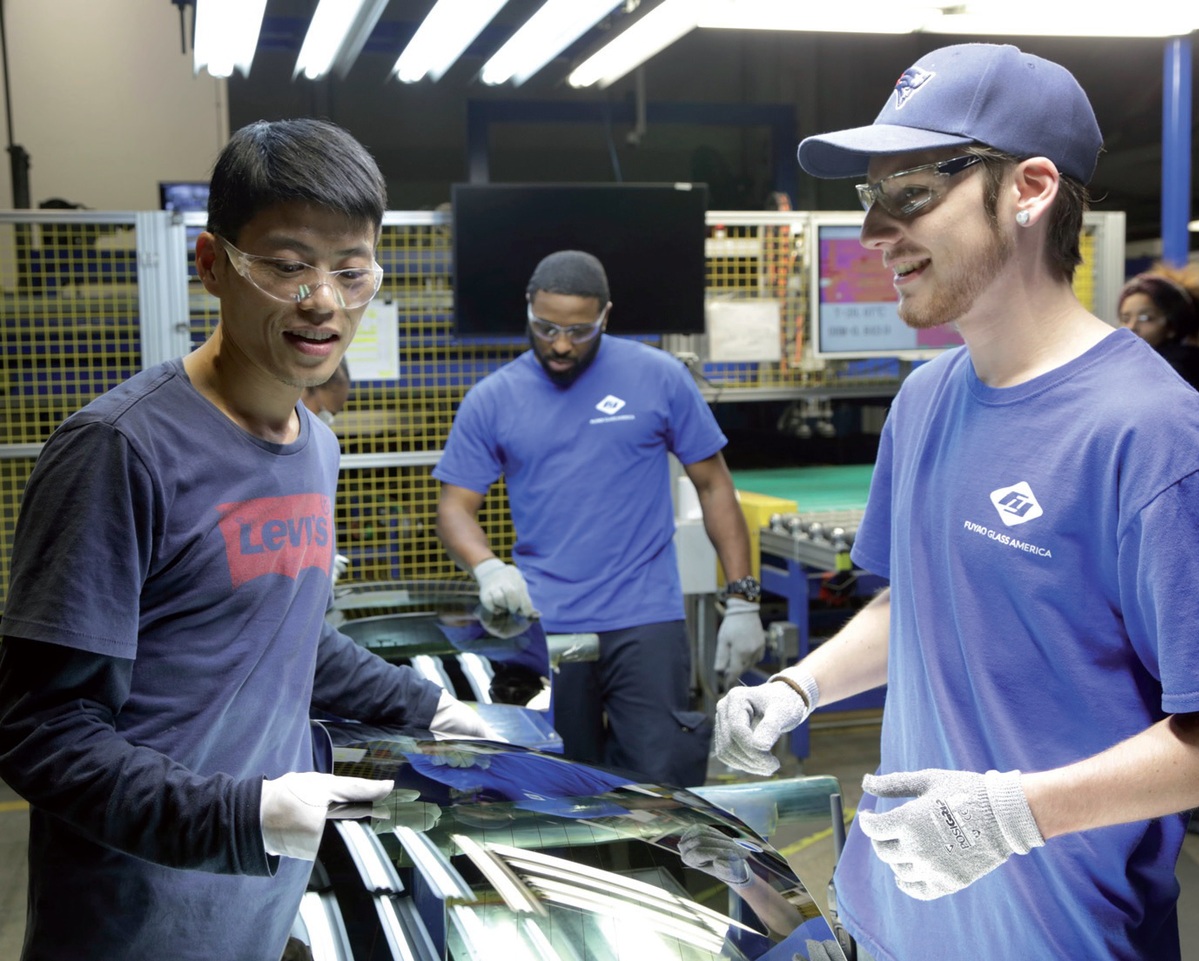Chinese plant focus of American Factory
By HONG XIAO in New York | China Daily | Updated: 2019-08-22 23:02

A documentary about a Chinese-run factory in Ohio, backed by Barack and Michelle Obama's Netflix production company, is drawing praise for its realistic depiction of what happens when two different cultures meet in the workplace.
The film American Factory, which debuted Wednesday, tells the story about Fuyao Glass' plant in Dayton, Ohio.
In 2015, Fuyao moved into a shuttered General Motors plant and established its first manufacturing plant in the United States. It has become the world's largest auto-glass manufacturing site, with 2,000 local blue collar workers hired.
The story unfolds with the integration and conflicts between Chinese management and technicians and American workers at the company, providing a window on the impact of globalization in the workplace.
Directors Steven Bognar and Julia Reichert, a couple living in the Dayton area, filmed 1,200 hours of video over three years.
"People, like the people I grew up with, were not really seen in films, documentaries, on news. In the Midwest, in the heartland of America, you didn't hear from those folks," Reichert said.
"We want to give voice to people who don't appear on screen: working people, their stories, their struggles, their hopes. That should be on screen. Those (stories) should be out in the world, because that's as equally compelling as superheroes," said Bognar.
The film premiered at the 2019 Sundance Film Festival earlier this year. It was later acquired from Participant Media by Higher Ground Productions, the Obamas' Netflix production company, becoming the first release by the former first couple as producers.
In a 10-minute conversation, the Obamas talked with the directors about the documentary and the importance of storytelling.
"One of the many things I love about this project that you two did together is that you let people tell their own story," the former first lady said in a video American Factory: A Conversation with the Obamas released on Netflix with the film Wednesday.
"The American Factory doesn't come in with a perspective. It's not an editorial. You truly let people speak for themselves. And that is a powerful thing that you don't always see happen," she praised.
"What I was struck by was they (workers) exhibited a lot more trust than I would've expected. I think one of the things that makes the movie powerful is the fact that it's not all black-and-white. There's a bunch of gray," said former US president Barack Obama.
In the opening scenes of the film, genuine attempts by Chinese and American employees to build teamwork appear to bear some fruits.
Local residents in the post-Industrial Era expressed their gratitude about an opportunity to get a job with a decent paycheck and have a chance to learn the latest glass-production technology.
The workers appear to grow closer via teaching and learning, fishing, horseback riding and celebrating Thanksgiving together.
But as the company grew alarmed by heavy financial losses, management switched to a more market-oriented strategy, with a more efficient working mechanism, which led to a difference of opinions at the factory.
"I never thought a documentary on an American manufacturing plant would be so interesting," said one commenter on the film's IMDB page. "Extremely interesting insight into the world of manufacturing in small-town USA as well as the cultural differences between the USA and China. The whole trip to the China factory seems surreal."
The Chinese in the film, who go by a creed of diligence and simplicity, appear willing to sacrifice rest time for better work results.
Many American workers, however, who believe in individualism, consider work-life balance to be paramount, viewing time on the job as a way to make money to enjoy life more.
"Admittedly, in the early days, it was exciting, these cultures coming together. And you see that in the film," Bognar said. "There's a lot of optimism. And we were there. And as things got hard, we were still there. We were lucky, people trusted us with their story, and we tried to represent them, and that's a huge responsibility."
"The documentary is informative, and I can tell that the whole shooting process was really transparent," said Leo Chan, executive director of the Midwest USA Chinese Chamber of Commerce in Cincinnati, Ohio, who attended a screening ceremony on Tuesday.
Chan said he could see how the fast-changing external environment, such as a profit-driven market and automation replacing manpower, put pressure on interpersonal relationships at the company.
"No one can judge it clearly," he told China Daily.
Chan said the film is a good example of the Sino-American cooperation process, "from the contact and blending of cultures between the two sides at the beginning, to conflict and friction. It is typical, and is a microcosm of Sino-US cooperation."
In April, the film won the Best Documentary Feature Award at the RiverRun International Film Festival in North Carolina.
And because American Factory also debuted in a few select theaters this week, it will be eligible for an Academy Award nomination next year, Fast Company reported.
























